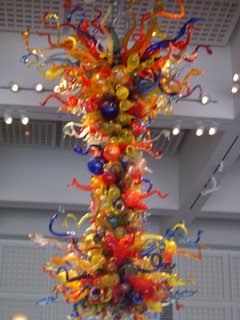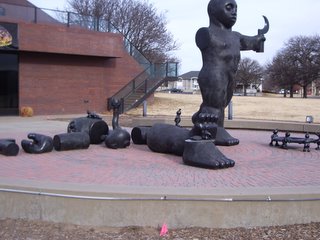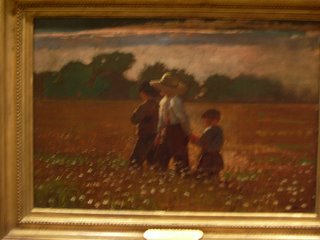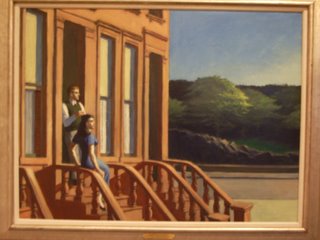Wondering about blog traffic
Last night, over at his fine blog Nobody Asked . . . , Winston asks the question I'm pretty sure just about every blogger wonders at one time or another: whether anyone reads his blog besides a few faithful commenters. This seems to have been on his mind the past few days, seeing as he alludes to it in his comment on my post here noting the 6,000th visitor to my site since I posted a counter. But I'm not picking on him for wondering. I myself STILL wonder.
What follows here is a pretty rambling meditation on whether or not to count and, if you do choose to, just what exactly is being counted.
By way of beginning, I've chosen to compare/contrast the blog-traffic philosophies of two bloggers whom I've linked to and whom I very much admire, then I'll get around to discussing my own take on all this.
Some bloggers, the most prominent I know of being Jeremy Freese, adamantly refuse to put counters on their sites. Freese would argue, I suspect, that he doesn't want to know just how many people visit his site. Not wanting to know, by the way, is rather different from not caring. And Freese DOES care, some, as evidenced by the fact that he has a Frappr map for his blog and provides a Blogroll link for those who care to add his blog to their blogrolls. But he doesn't do those things that bloggers do to try and drive traffic their way, like joining blog rings or listing their blogs in directories. If people link to his stuff and others find their way via the links, then fine by him. Whether they keep returning or never ever return, he'll be none the wiser. He clearly enjoys blogging, but expanding and keeping an audience is not what drives his blogging, as nearly as I can tell.
A representative of the other end of this continuum is "SB" of Watermark. I don't know of another blog with this many links to other blogs, memberships in blog rings, listings in directories, etc. It's really a bit overwhelming to contemplate how she manages to keep up with all this. But then again, she is a real advocate of promoting other people's blogs, too; it's from Watermark, as I've mentioned before, that I got the idea for encouraging others to visit and link to some of the "insignificant microbes" of the blogosphere. So, sure: SB cares a lot about traffic and has done all she can to draw some to Watermark, but she also tries to send some out. Other blogs, and I'm sure we've all seen them, are only about themselves in the end.
Now to me. I look at that number "6000" (which, by the way, is a count of "unique visitors"--both first-time and returning visitors) and to me it seems an impressive number at first, given the kind of blog I have. But then I think about who/what is represented by that number, and it soon begins to appear a whole lot less impressive.
I mentioned in the thank-you post that a lot--well over a hundred--of those numbers indicate my own visits to my site via other computers. My Statcounter tells me that 75 of my last 100 "visitors" stayed less than 5 seconds--so extrapolate that ratio out over a few thousand visits. Although I'm thankful that the members of Blog Advance are such avid surfers, their visits are less about visiting my blog and more about earning credits. Most of them have stayed only the requisite 30 seconds. For a few glorious days back in October, a couple hundred people were drawn here because this post showed up in Technorati searches. Where are those folks now? And how long did they stay in the first place? Once that particular 15 minutes was past, they went elsewhere to spend another 15 minutes.
I know all this stuff because I have counters that keep track of such things. There ARE counters out there that only keep track of hits, and there are times when I have to admit that the chef advantage of the absolute, unbreakdownable number is precisely that it's unbreakdownable. It's hard to become obsessive about a simple number. But I like knowing how people find their way here and what they read when they do get here. I like knowing that I have between a dozen and 20 regular visitors. I'm pleased that the posts people read the most are, by and large, the ones I would choose as my favorites. I'm also pleased that, of late, I've been getting more return visitors per day, and my visitors have tended to stay longer (it used to be that well over 80 of every 100 visitors stayed less than 5 seconds). I wouldn't know any of this if it weren't for the counters. And I don't think knowing it has changed what I write about and how I write about it.
This will never be a high-traffic blog because it doesn't have rapidly-changing content (see the more prominent political blogs), it isn't about technology or sex; indeed, it's not focused on much of anything. But I enjoy keeping it up, and--thanks in large measure to others who have linked to it--it is finding and growing an audience. While I don't need to have counters to accomplish all that, I'd be less aware that that is happening and grateful to those who have helped make it happen.
Technorati tags:
Weblogs, Blogs, Website counters






































